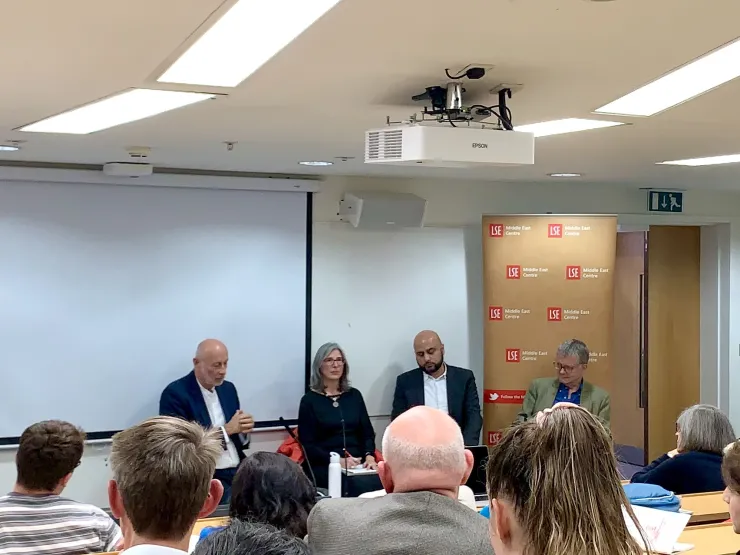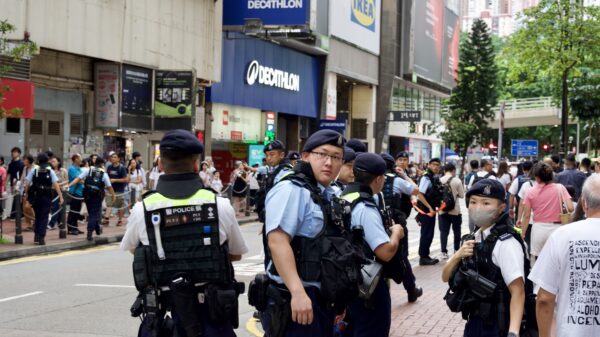The London School of Economics (LSE) Middle East Centre hosted a panel discussion entitled ‘Israel, Gaza and the Wider Regional Conflict: Assessing the Probability of a Broader War’ on 9 October, 2024. Panellists discussed the growing ramifications of conflict in the Middle East.
The panel chair, Toby Dodge, opened the conference by stating the event is protected by the LSE Code of Practice on Free Speech. He then introduced the panellists: Nicola Pratt, Mohammad Ali Shabani and Yezid Sayigh.
Nicola Pratt is a Professor of International Politics of the Middle East at the University of Warwick, with a strong focus in feminist research.
Mohammad Ali Shabani is the editor of Amwaj.media, a platform focusing on Iraq, Iran and the Arabian Peninsula. He frequently travels between the Middle East and London, often appearing in leading media outlets.
Yezid Sayigh, a former lecturer and researcher at King’s College London (KCL) and the universities of Oxford and Cambridge, is now a senior fellow at the Malcolm H. Kerr Carnegie Middle East Center in Beirut, Lebanon. He was also an advisor, negotiator and policy planner in the Palestinian delegations’ peace talks with Israel from 1992 to 2002.
The panel discussion was divided into sections by speaker, beginning with Professor Pratt.
Nicola Pratt: A Historical Perspective
Pratt began the panel by acknowledging the anniversary of 7 October, widely marked as the trigger for the current war. She expressed her heartbreak and anger, as well as her sympathies for Lebanon as the war extends into their southern suburbs.
Warning that southern Lebanon might be ‘Gazafied’, Pratt sees a high probability of a broader war. She posited that escalation needs to stop now.
Emphasising the current devastation and level of destruction that has already taken place, she pointed out there is already a whole traumatised generation in Gaza: even if the war were to stop now, it would still take years to recover.
In her mind, high stakes are at play and there is a real possibility for all-out war in the region. Urging attendees to think about the people on the ground and the expansion of Israel’s operation beyond Gaza, she also noted an increasing likelihood of ethnic cleansing.
She pointed to several statistics to solidify her argument, such as the difference in casualties during the wars in 2008, 2009 and 2014 compared to the first week of the current conflict.
Pratt believes that what we are seeing right now is unprecedented violence. She raised concerns that Biden’s red lines have not been honoured and that the International Criminal Court has yet to issue arrest warrants for Netanyahu and Israel’s Minister of Defence, Yoav Gallant. Citing the Dahiya doctrine, an Israeli military strategy coined in 2006 involving the large-scale destruction of civilian infrastructure, and quoting Vladimir Jabotinsky, a revisionist Zionist leader:
If you wish to colonise a land in which people are already living, you must find a garrison for the land or find a benefactor who will provide a garrison on your behalf
In Pratt’s view, Israel has found its supportive benefactor: the United States. She asserted that Israel will undoubtedly continue on its current course until the international community addresses the root cause of the war–the suppression of Palestinian freedom.
Muhammad Ali Shabani – Misperceptions and Nuclear Arms
Shabani took a different approach, looking at 7 October from the perspective of Iran. In his view, there is a divide between viewing 7 October as either a grand victory that prevented diplomatic normalisation between Saudi Arabia and Israel or as a massive disaster that has increasingly branded Iran as politically toxic and negated previous agreements with the United States.
Shabani believes that Iran has attempted to ‘thread the needle’. Without becoming too involved in the conflict, it still seeks to apply pressure on Israel by preventing attacks on disputed territory or the dismantling of the ‘Axis of Resistance‘, a network of Iranian-backed groups in the Middle East including Hamas, Hezbollah, the Houthis and various Shi’ite armed groups in Iraq and Syria.
From this, he argued that the current conflict is heavily based upon misconceptions about Israel’s strength and wider geopolitics.
Shabani views the United States as no longer being a restraining factor to Israel. Referring to the 10-year security assistance ‘Memorandum of Understanding between Israel and the United States’ and the 2014 U.S.-Israel Strategic Partnership Act, which authorised the US Department of Homeland Security to provide $3.8 billion in funding to Israeli government agencies’ research pilot programs, Shabani noted that this funding has now increased by nearly 400%. He asserted that Iran held a deep misconception about just how far the United States under the Biden administration were willing to go in their support for Israel.
On the elimination of Hassan Nasrallah, Shabani reflected that the former Hezbollah leader was not simply a political leader but also a strategic leader, a clergyman and a respected and commanded authority. Shabani believes we will likely see rising division in Iran in the fallout of his assassination, which will make the country harder to manage in the global arena.
Shabani believes that there is also a high probability of broader war due to this conflict and the strong international misconceptions of government intentions.
Yezid Sayigh – Wider Perspectives, The Future and International Law
On the probability of a broader war and on the acceleration of far-right politics, Sayigh predicted:
More and more of the rest of us are about to find our world overturned.
Sayigh picked up on Shabani’s emphasis on miscalculation, emphasising that Iran, Hamas and Iraq committed grave errors in judgment throughout this conflict.
Drawing a parallel to Archduke Franz Ferdinand’s assassination triggering the First World War, Sayigh viewed 7 October as an ‘opening shot’ that triggered a swell of change across the world and politics: in the past two decades, globalisation has incited the slow rise of far-right groups and political actors in Western democracies. These parties have long understood that international politics was going to shift and that a moment of instability could be seized to take advantage of it.
He also pointed out the impact of globalisation and these rapid changes on societies in the Middle East, explaining that these shifts have led to precariousness in the region. Sayigh stated that what we see in Israel, as elsewhere in the world, is the ascension of the far-right and decay of the centre in the political arena.
Recognising a global problem of politicians ignoring issues that are not seen as politically advantageous, he posited that the fight against the rise of extremism abroad starts at home.
Sayigh believes that our international legal systems and the rule of law cannot be revived. To him, these structures are behind us. Technological advancements, especially in warfare, have created an environment where governments increasingly disregard international law as it loses relevance and compatibility with current tactics and concerns.
Sayigh expressed his fear that we are heading towards a world in which it is okay to use drones and technology to demolish civilian areas, creating free fire zones–a world in which politicians have learned that they need not fear accountability.
He concluded the panel by restating firmly that the war, and the influence of the far right, will continue to expand.
Q&A
Dodge closed the panel with a Q&A encompassing many questions on the current sentiment and changing political stage in the United Kingdom, Islamophobia, drone attacks and hypersonic missiles.
One attendee noted that he is “now realising this could be a much larger conflict than we think, a Sarajevo moment like the speaker on the far left [Sayigh] called it”.
The panel agreed that ‘vacuums’–governments built without firm policy–create spaces where people do not see any tangible changes in their lives. This condition may turn them to political extremes.
Ending with a hopeful recommendation, Pratt emphasised the need to hold space for civil society and the role of popular protest in keeping all issues important to the people on global governments’ agendas.









